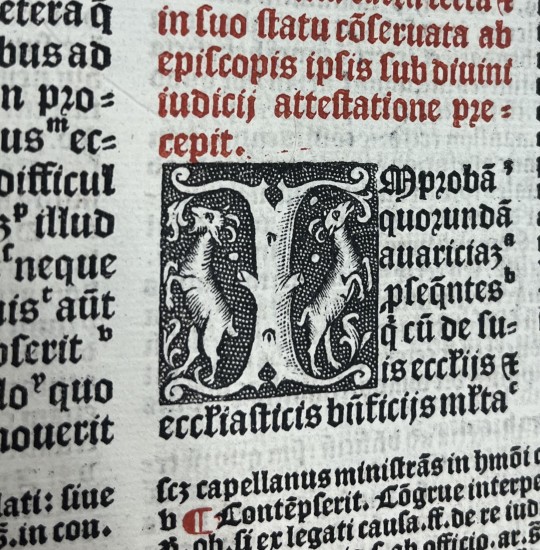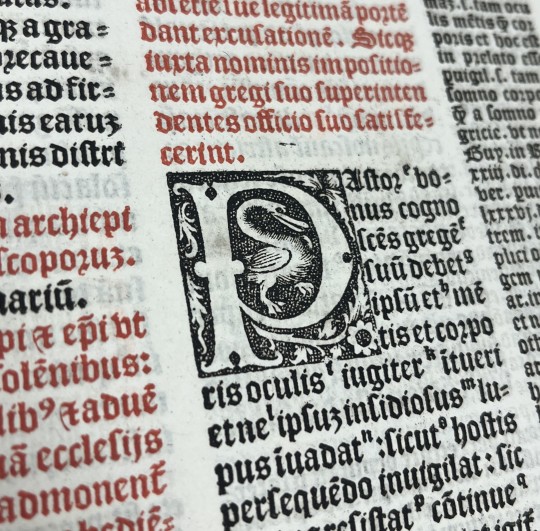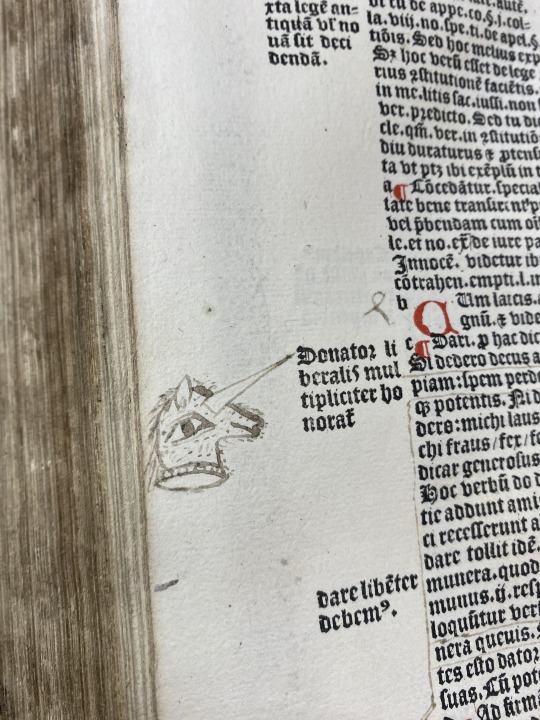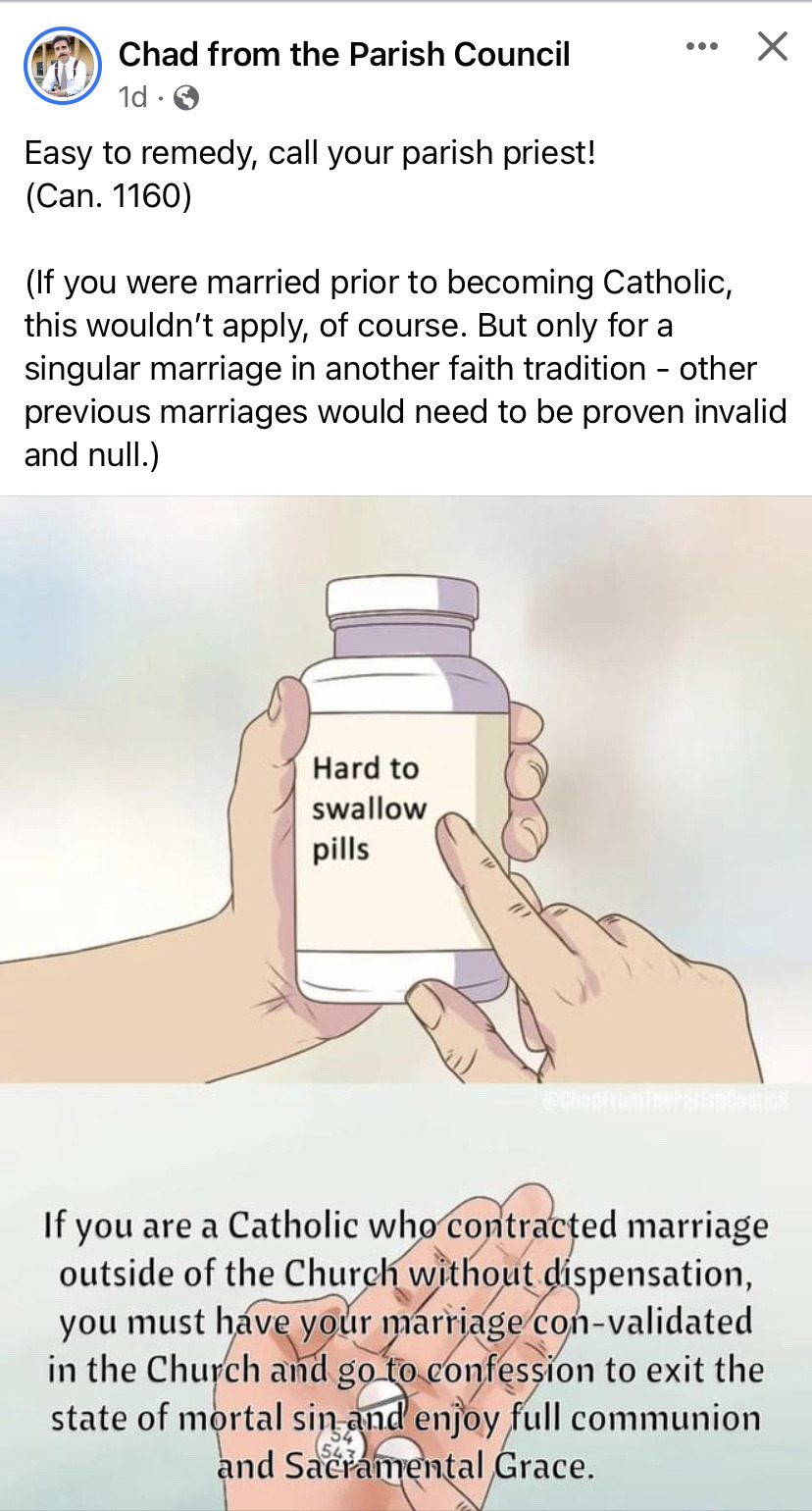#canon law
Text




A mixed bag of letters and animals (featuring a couple of dragons!) from a beautiful 1525 book of Canon law. Someone please make these decorated initials into Bananagrams tiles.
#riesenfeld center#umn#university of minnesota law#university of minnesota law library#rare books#umn law#special collections#archives#law#canon law#dragons#initials#bananagrams
571 notes
·
View notes
Note
Hello Josh,
Pentiment is one of my favorite games of all time. It’s an emotional journey for me. I can relate to Andreas’s melancholy and really like the character arc for him. Thank you for creating this amazing story.
I have a question about Seal of Confession in Pentiment. Sister Amalie disclosed Brother Guy’s confession to Andreas and explained why Guy can’t be protected by Seal of Confession. But as a catholic I was taught that Seal of Confession cannot be violated under any circumstances, and the seal also applies to anyone who overhears a confession. I assumed that the rule was different in Middle Ages. Did canon law back in 16th century mention anything about eavesdropping confessions?
Thank you. I'm glad you enjoyed it.
Certainly under modern canon law, Sister Amalie would be subject to church discipline equal to that of a priest who violated the seal, which could include excommunication.
Re: 16th century canon law on witnesses to confession other than the confessor: the Fourth Lateran Council (1215) did not mention witnesses, only the confessor:
Canon 21: On yearly confession to one’s own priest, yearly communion, the confessional seal
All the faithful of either sex, after they have reached the age of discernment, should individually confess all their sins in a faithful manner to their own priest at least once a year, and let them take care to do what they can to perform the penance imposed on them. Let them reverently receive the sacrament of the eucharist at least at Easter unless they think, for a good reason and on the advice of their own priest, that they should abstain from receiving it for a time. Otherwise they shall be barred from entering a church during their lifetime and they shall be denied a Christian burial at death. Let this salutary decree be frequently published in churches, so that nobody may find the pretense of an excuse in the blindness of ignorance. If any persons wish, for good reasons, to confess their sins to another priest let them first ask and obtain the permission of their own priest; for otherwise the other priest will not have the power to absolve or to bind them. The priest shall be discerning and prudent, so that like a skilled doctor he may pour wine and oil over the wounds of the injured one. Let him carefully inquire about the circumstances of both the sinner and the sin, so that he may prudently discern what sort of advice he ought to give and what remedy to apply, using various means to heal the sick person. Let him take the utmost care, however, not to betray the sinner at all by word or sign or in any other way. If the priest needs wise advice, let him seek it cautiously without any mention of the person concerned. For if anyone presumes to reveal a sin disclosed to him in confession, we decree that he is not only to be deposed from his priestly office but also to be confined to a strict monastery to do perpetual penance.
The Corpus Juris Canonici may cover this, but I would make two statements here: 1) detailed canon law was not something most parish priests or certainly anchoresses would be familiar with 2) it's late and I don't want to try to search through the UCLA's digital library copy of the Corpus Juris Canonici.
That said, I do have a copy of Thomas Tentler's Sin and Confession on the Eve of the Reformation which gets into the weeds on what was going down in the Holy Roman Empire in the early 16th century. I used it as the basis for a lot of the specifics in Father Thomas' Saint John's Day confessions. I'll try to look it up this question tomorrow.
86 notes
·
View notes
Text
Ms. Codex 723 is a 12th century French copy of the canon law collection Panormia, by Saint Ivo, Bishop of Chartres. The text is drawn from papal letters, councils, and teachings of the Church fathers. It's in a very nice wooden binding, and the pages are fairly plain, decorated only with blue and red letters and one charming inhabited initial.
🔗:
#medieval#manuscript#medieval manuscript#12th century#france#illustration#inhabited initial#parchment#canon law#history of law#book history#rare books#video
47 notes
·
View notes
Note
Having just recently attended a "shotgun wedding" myself, just curious in the Medieval Ages did it matter for inheritance for royals or high nobility if it was clear the precious little heir-to-be was obviously conceived before the wedding ceremony?
That's an excellent question!

The medieval Catholic Church often gets a bad rap on matters of marriage and sexuality, but the historical record often shows them to be more moderate and reasonable (if still profoundly premodern and often quite weird) than their reputation would suggest.
Specifically on the topic of bastardy, the medieval Catholic Church was not nearly as harsh and unforgiving in its canon law as the Westerosi. The Church's attitude was that, while sex out of wedlock was a sin, it was a sin that belonged to the parents and not to the child, so punishing the child would be unjust.
So what about the in-between area of a bride-to-be with a premarital pregnancy? Well, as far as canon law is concerned, a true shotgun wedding wouldn't be valid because the consent of the people getting married has been coerced - and to their credit, the medieval Catholic Church really cared about consent in marriage to the extent possible in a patriarchal society where marriage alliances were absolutely central to the acquisition and transfer of landed property and political power.
However, if the couple was just merely enthusiastic about their engagement and genuinely consented to be married, premarital pregnancy is not considered a canonical impediment to marriage and the marriage would be considered valid.
Likewise, because the Catholic Church saw it as its mission to encourage marriage and birth within wedlock and that punishing a child for the sins of the father was unjust, the Church was (and is) pretty liberal in how it treats the legitimacy of children. So for example, a child born but not concieved in wedlock is considered legitimate in canon law and thus would be entitled to baptism, confirmation, marriage, and other sacraments and would be treated like any other legitimate child in so far as their inheritance rights were concerned.
191 notes
·
View notes
Text
Canon law of the Catholic Church
Canon law refers to the system of laws and legal principles made and enforced by the hierarchical authorities (the bishops and ultimately the Pope) of the Catholic Church to regulate its external organization and government and to order and direct the activities of Catholics toward the mission of the Church. The term "canon" is derived from the Greek word "kanon," meaning a rule or measure.
The current Code of Canon Law for the Latin Church (also known as the Western Church or the Roman Catholic Church) was promulgated by Pope John Paul II in 1983. It replaced the previous Code of Canon Law, which had been in place since 1917. The Eastern Catholic Churches, which are in full communion with Rome but have their own distinct traditions, have their own codes of canon law.
The Code of Canon Law is divided into several books, each dealing with different aspects of Church life. Some of the key areas covered by canon law include:
Book I: General Norms: This book establishes the general principles and norms that apply to the entire Code.
Book II: The People of God: This book deals with the hierarchical structure of the Church, including the rights and obligations of the faithful (laypeople and clergy).
Book III: The Teaching Function of the Church: This book covers the ministry of the Word of God, including preaching and teaching.
Book IV: The Sanctifying Function of the Church: This book addresses the sacraments and other liturgical celebrations.
Book V: The Temporal Goods of the Church: This book outlines the administration and management of Church property and finances.
Book VI: Sanctions in the Church: This book deals with penalties in the Church, including both the censures and other punitive measures.
Book VII: Processes: This book outlines the judicial procedures used in the Church, including the handling of contentious and penal cases.
The Code of Canon Law is an essential tool for the governance and discipline of the Catholic Church. It is important to note that the Eastern Catholic Churches have their own distinct codes, such as the Code of Canons of the Eastern Churches. Additionally, individual dioceses and religious orders may have their own particular laws and statutes, provided they do not conflict with the universal law of the Church.
#Canon Law#Catholic Church#Code of Canon Law#Ecclesiastical Law#Church Governance#Canon Law Jurisprudence#Religious Legal System#Church Hierarchy#Ecclesiastical Structure#Canon Lawyer#Sacramental Law#Catholic Jurisprudence#Church Discipline#Canonical Penalties#Ecclesiastical Courts#Pastoral Governance#Catholicism#Ecclesiology#Church Administration#Canon Law Studies#today on tumblr#deep thoughts#deep thinking#new blog
0 notes
Text

Diavolo's 1987th death.. or 1983rd?
#myart#chloesimagination#comic#patron request#jojo bizarre adventure#jjba fanart#jjba#diavolo jojo#golden wind#fnaf#fnaf 4#fnaf fanart#five nights at freddy's#fnaf movie#bite of 83#bite of 87#golden freddy#spring bonnie#Idk Diavolo lost count of how many times he’s died give him a break#by JoJo law this is canon#also Diavolo and funtime/glamrock Freddy share a voice actor#so this just fits actually
4K notes
·
View notes
Text


clown4clown
#one piece#buggy the clown#donquixote rosinante#corabug#laws life is so hard. tfw ur clown dad starts dating another clown#also i didnt look at a reference for their canon heigh difference which is. well its a lot. much more than how i drew it#i dont have a way to play bg3 like all my friends so instead im getting really into clowns.#clown cw
4K notes
·
View notes
Photo

A manicule, but make it a unicorn. A unicornicule?
This wonderful little surprise appeared in the margins of a 1505 book of English canon law.
#unicorn#marginalia#margin mondays#annotation#16th century#English law#legal history#canon law#latin#rare books#old books#riesenfeld center#umn law#university of minnesota#law library
3K notes
·
View notes
Text

Me dieron esas vibras jajs
Extrañaba hacer curis de One Piece
#one piece#canon in my heart#luffy#trafalgar law#one piece luffy#trafalgar one piece#law one piece#eustass captain kidd#eustass kid#kidlawlu#kidlu#lawlu#kidlaw#doodles#twitter#meme#fanart#humor
1K notes
·
View notes
Text
For #CoffeeWithACodex this week (12pm Noon EST on Thursday, February 22) Curator Dot Porter will bring out Ms. Codex 723, the Panormia, a book of canon law in 8 parts by Ivo of Chartres. The manuscript is quite early, written in France in the 12th century. Everyone is welcome!
Register here to join us on Zoom:
#medieval#manuscript#medieval manuscript#illustration#law#canon law#history of law#book history#rare books#12th century#france
32 notes
·
View notes
Note
For papal dispensations when Medieval nobles married cousins, as often happened, how did one go about getting them? It does seem a tad excessive that at one point anything closer than a seventh cousin technically needed a dispensation. Were there particular areas where people were more lapse on such close unions?
Great question!
Let’s start by clearing up a few common misconceptions. We should start by pointing out that dispensations were an innovation of the late High Middle Ages, as part of Innocent III’s campaign of papal supremacy. This wasn’t particularly popular, (in no small part because Innocent would not stop fucking with secular rulers in Iberia, the Holy Roman Empire, Sicily, Norway, France, Sweden, Bulgaria, and England) and the dispensation was part of that broader political effort.

Legally, dispensations emerged as an assertion that the Pope possessed the exclusive plenary power to issue exemptions from the law, rather than it being a concurrent authority shared with secular power, because as Innocent saw it, the Pope was a prince and “the prince is not bound by the laws.” This is why, despite Innocent III’s (IMO) largely unearned reputation (remember, this is the same dude responsible for the own goal of the Fourth Crusade, the moral abomination of the Albigensian Crusade, and quite a bit of anti-Semitic decrees in Fourth Lateran), even his successors had to agree that this was massively open to abuses and might lead to a Reformation or something down the line, leading to a series of reforms on down through the centuries.
Second, not all dispensations were papal. Bishops as well as Popes could issue dispensations, on marriage and other issues, but the Pope was kind of the court of final appeals for the whole process, so marriage dispensations of royals tended to get kicked upstairs for political and moneymaking reasons, but local noblemen could usually keep their cases local.
30 notes
·
View notes
Text

small sketch study
#one piece#trafalgar law#trafalgar d water law#blood cw#when I can source my whump organically right from canon#my art
2K notes
·
View notes
Text
Nothing much happened .
Note to readers – the title of my blog post today is actually a misquote of something that wasn’t said in the first place but given the circumstances the made up misquote is quite funny ; i’ll get to it ‘dreckly’ as we say in Cornwall.
Blog time : it’s the end of week 3 of year 3 of my Pathfinder build and I can confidently say that nothing of importance got done this week because what I am…

View On WordPress
0 notes
